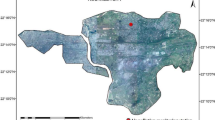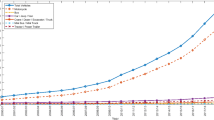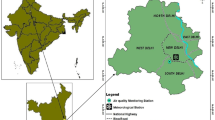Abstract
In this study, three different goals are pursued. Firstly, it is aimed to model particulate matter (PM) of Ankara, the capital of Turkey, by utilizing hybrid deep learning methodology. To do this, five different methodologies are proposed in which four of them are hybrid methods. Three different evaluation criteria as coefficient of determination (R2), mean absolute error (MAE) and mean squared error (MSE) are used to compare the proposed methods. In the test set, the hybrid model which consists of feed-forward neural networks, convolution neural network and long short-term neural networks has the best performance with R2 of 0.81, MSE of 73.07 and MAE of 5.6. Secondly, PM levels are categorized to form a prediction challenge in accordance with the World Health Organization standards. The particulate matter level is divided into two categories as being low or not, being moderate or not and being dangerous or not, it is shown that the proposed hybrid model which has the highest performance on forecasting, also worked perfectly in the classification task with accuracy of 94%. Finally, the effect of different pollutants and meteorological variables on the prediction of PM is investigated by employing ensemble machine learning methodology of random forest regression, extra tree regression and multiple linear regression. According to the results of the analysis, it is shown that the most important predictor variables of PM are its own lagged values, other pollutants, earth skin temperature and the wind speed.







Similar content being viewed by others
Data availability
The datasets used and/or analyzed during the current study are available from the corresponding author on reasonable request.
Abbreviations
- ANN:
-
Artificial neural networks
- CNN:
-
Convolution neural network
- FNN:
-
Feed-forward neural networks
- GRU:
-
Gated recurrent units
- LSTM:
-
Long short-term memory
- MAE:
-
Mean absolute error
- MSE:
-
Mean square error
- PM:
-
Particulate matter
- R 2 :
-
Coefficient of determinant
- RMSE:
-
Root-mean-square error
- RNN:
-
Recurrent neural networks
References
Abadi M, Barham P, Chen J, Chen Z, Davis A, Dean J et al (2016) Tensorflow: A system for large-scale machine learning. In: 12th {USENIX} symposium on operating systems design and implementation, pp 265–283
AG (2021) Webpage of Ankara Governorship. http://www.ankara.gov.tr/ekonomik-durum#. Accessed 1 Feb 2021
Akdi Y, Ünlü KD (2021) Periodicity in precipitation and temperature for monthly data of Turkey. Theor Appl Climatol 143:957–968. https://doi.org/10.1007/s00704-020-03459-y
Akdi Y, Okkaoğlu Y, Gölveren E, Yücel ME (2020a) Estimation and forecasting of PM 10 air pollution in Ankara via time series and harmonic regressions. Int J Environ Sci Technol 17:3677–3690. https://doi.org/10.1007/s13762-020-02705-0
Akdi Y, Gölveren E, Okkaoğlu Y (2020b) Daily electrical energy consumption: periodicity, harmonic regression method and forecasting. Energy 191:116524. https://doi.org/10.1016/j.energy.2019.116524
Alpaydin E (2020) Introduction to machine learning, 978-0-262-0121109, MIT Press
Ayturan YA, Ayturan ZC, Altun HO, Kongoli C, Tuncez FD, Dursun S, Ozturk A (2020) Short-term prediction of PM2.5 pollution with deep learning methods. Global NEST J 22(1):126–131.https://doi.org/10.30955/gnj.003208
Barthwal A, Acharya D, Lohani D (2021) Prediction and analysis of particulate matter (PM2.5 and PM10) concentrations using machine learning techniques. J Ambient Intell Hum Comput. https://doi.org/10.1007/s12652-021-03051-w
Bozdağ A, Dokuz Y, Gökçek ÖB (2020) Spatial prediction of PM10 concentration using machine learning algorithms in Ankara. Turkey Environ Pollut 263:114635. https://doi.org/10.1016/j.envpol.2020.114635
Cekim HO (2020) Forecasting PM10 concentrations using time series models: a case of the most polluted cities in Turkey. Environ Sci Pollut Res 27:25612–25624. https://doi.org/10.1007/s11356-020-08164-x
Cheng Y, Zhang H, Liu Z, Chen L, Wang P (2019) Hybrid algorithm for short-term forecasting of PM2.5 in China. Atmos Environ 200:264–279. https://doi.org/10.1016/j.atmosenv.2018.12.025
Cho K, Van Merriënboer B, Gulcehre C, Bahdanau D, Bougares F, Schwenk H, Bengio Y (2014) Learning phrase representations using RNN encoder-decoder for statistical machine translation. arXiv preprint http://arxiv.org/abs/1406.1078
Correia AW, Pope CA III, Dockery DW, Wang Y, Ezzati M, Dominici F (2013) The effect of air pollution control on life expectancy in the United States: an analysis of 545 US counties for the period 2000 to 2007. Epidemiology 24(1):23. https://doi.org/10.1097/EDE.0b013e3182770237
Deep B, Mathur I, Joshi N (2021) An approach to forecast pollutants concentration with varied dispersion. Int J Environ Sci Technol. https://doi.org/10.1007/s13762-021-03378-z
Dutta A, Kumar S, Basu M (2020) A gated recurrent unit approach to bitcoin price prediction. J Risk Financ Manag 13(2):23. https://doi.org/10.3390/jrfm13020023
Fang Y, Naik V, Horowitz LW, Mauzerall DL (2013) Air pollution and associated human mortality: the role of air pollutant emissions, climate change and methane concentration increases from the preindustrial period to present. Atmos Chem Phys 13(3):1377–1394. https://doi.org/10.5194/acp-13-1377-2013
Feng X, Li Q, Zhu Y, Hou J, Jin L, Wang J (2015) Artificial neural networks forecasting of PM2. 5 pollution using air mass trajectory based geographic model and wavelet transformation. Atmos Environ 107:118–128. https://doi.org/10.1016/j.atmosenv.2015.02.030
Franceschi F, Cobo M, Figueredo M (2018) Discovering relationships and forecasting PM10 and PM2.5 concentrations in Bogotá, Colombia, using artificial neural networks, principal component analysis, and k-means clustering. Atmos Pollut Res 9(5):912–922. https://doi.org/10.1016/j.apr.2018.02.006
Friedman J, Hastie T, Tibshirani R (2001) The elements of statistical. Springer Series in Statistics, New York
García Nieto PJ, Sánchez Lasheras F, García-Gonzalo E et al (2018) Estimation of PM10 concentration from air quality data in the vicinity of a major steelworks site in the metropolitan area of Avilés (Northern Spain) using machine learning techniques. Stoch Environ Res Risk Assess 32:3287–3298. https://doi.org/10.1007/s00477-018-1565-6
Genc DD, Yesilyurt C, Tuncel G (2010) Air pollution forecasting in Ankara, Turkey using air pollution index and its relation to assimilative capacity of the atmosphere. Environ Monit Assess 166:11–27. https://doi.org/10.1007/s10661-009-0981-y
Goodfellow I, Bengio Y, Courville A (2016) Deep learning. MIT Press, http://www.deeplearningbook.org
Guaita R, Pichiule M, Maté T, Linares C, Díaz J (2011) Short-term impact of particulate matter (PM2.5) on respiratory mortality in Madrid. Int J Environ Health Res 21(4):260–274. https://doi.org/10.1080/09603123.2010.544033
Guo L, Chen B, Zhang H et al (2020) A new approach combining a simplified FLEXPART model and a Bayesian-RAT method for forecasting PM10 and PM2.5. Environ Sci Pollut Res 27:2165–2183. https://doi.org/10.1007/s11356-019-06605-w
Halonen JI, Lanki T, Yli-Tuomi T, Tiittanen P, Kulmala M, Pekkanen J (2009) Particulate air pollution and acute cardiorespiratory hospital admissions and mortality among the elderly. Epidemiology 20:143–153
Hochreiter S, Schmidhuber J (1997) Long short-term memory. Neural Comput 9(8):1735–1780. https://doi.org/10.1162/neco.1997.9.8.1735
Ibrir A, Kerchich Y, Hadidi N et al (2020) Prediction of the concentrations of PM1, PM2.5, PM4, and PM10 by using the hybrid dragonfly-SVM algorithm. Air Qual Atmos Health. https://doi.org/10.1007/s11869-020-00936-1
Kleine Deters J, Zalakeviciute R, Gonzalez M, Rybarczyk Y (2017) Modeling PM2.5 urban pollution using machine learning and selected meteorological parameters. J Electr Comput Eng. https://doi.org/10.1155/2017/5106045
Kim KH, Kabir E, Kabir S (2015) A review on the human health impact of airborne particulate matter. Environ Int 74:136–143. https://doi.org/10.1016/j.envint.2014.10.005
Kow PY, Wang YS, Zhou Y, Kao IF, Issermann M, Chang LC, Chang FJ (2020) Seamless integration of convolutional and back-propagation neural networks for regional multi-step-ahead PM2.5 forecasting. J Clean Prod 261:121285. https://doi.org/10.1016/j.jclepro.2020.121285
Liu H, Jin K, Duan Z (2019) Air PM2.5 concentration multi-step forecasting using a new hybrid modeling method: comparing cases for four cities in China. Atmos Pollut Res 10(5):1588–1600. https://doi.org/10.1016/j.apr.2019.05.007
Mogollón-Sotelo C, Casallas A, Vidal S et al (2020) A support vector machine model to forecast ground-level PM2.5 in a highly populated city with a complex terrain. Air Qual Atmos Health. https://doi.org/10.1007/s11869-020-00945-0
NAQMN (2020) National Air Quality Management Network. https://sim.csb.gov.tr/Services/AirQuality. Accessed 21 Nov 2020
NASA (2020) The power project, Data access viewer. https://power.larc.nasa.gov/. Accessed 21 Nov 2020
Niu M, Wang Y, Sun S, Li Y (2016) A novel hybrid decomposition-and-ensemble model based on CEEMD and GWO for short-term PM2. 5 concentration forecasting. Atmos Environ 134:168–180. https://doi.org/10.1016/j.atmosenv.2016.03.056
Okkaoğlu Y, Akdi Y, Ünlü KD (2020) Daily PM10, periodicity and harmonic regression model: the case of London. Atmos Environ 238:117755. https://doi.org/10.1016/j.atmosenv.2020.117755
Qi Y, Li Q, Karimian H, Liu D (2019) A hybrid model for spatiotemporal forecasting of PM2.5 based on graph convolutional neural network and long short-term memory. Sci Total Environ 664:1–10. https://doi.org/10.1016/j.scitotenv.2019.01.333
Patra AK, Gautam S, Majumdar S, Kumar P (2016) Prediction of particulate matter concentration profile in an opencast copper mine in India using an artificial neural network model. Air Qual Atmos Health 9(6):697–711. https://doi.org/10.1007/s11869-015-0369-9
Pearson JF, Bachireddy C, Shyamprasad S, Goldfine AB, Brownstein JS (2010) Association between fine particulate matter and diabetes prevalence in the US. Diabetes Care 33(10):2196–2201. https://doi.org/10.2337/dc10-0698
Perez L, Tobías A, Querol X, Pey J, Alastuey A, Díaz J, Sunyer J (2012) Saharan dust, particulate matter and cause-specific mortality: a case–crossover study in Barcelona (Spain). Environ Int 48:150–155. https://doi.org/10.1016/j.envint.2012.07.001
Sahu SP, Patra AK (2020) Development and assessment of multiple regression and neural network models for prediction of respirable PM in the vicinity of a surface coal mine in India. Arab J Geosci 13:890. https://doi.org/10.1007/s12517-020-05771-3
Schmidhuber J (1992) Learning complex, extended sequences using the principle of history compression. Neural Comput 4:234–242
Shahriar SA, Kayes I, Hasan K et al (2020) Applicability of machine learning in modeling of atmospheric particle pollution in Bangladesh. Air Qual Atmos Health 13:1247–1256. https://doi.org/10.1007/s11869-020-00878-8
Sherstinsky A (2020) Fundamentals of recurrent neural network (RNN) and long short-term memory (LSTM) network. Physica D 404:132306. https://doi.org/10.1016/j.physd.2019.132306
TSI (2021) Turkish Statistical Institute, Static Data Portal Webpage. https://data.tuik.gov.tr/. Accessed 6 Jan 2021
Wang P, Zhang H, Qin Z, Zhang G (2017) A novel hybrid-Garch model based on ARIMA and SVM for PM2.5 concentrations forecasting. Atmos Pollut Res 8(5):850–860. https://doi.org/10.1016/j.apr.2017.01.003
WHO (2021a) World Health Organization, Air pollution report. https://www.who.int/health-topics/air-pollution#tab=tab_1. Accessed 7 Feb 2021
WHO (2021b) World Health Organization, Air pollution report. https://www.who.int/airpollution/ambient/pollutants/en/. Accessed 7 Feb 2021
Wang P, Zhang G, Chen F, He Y (2019) A hybrid-wavelet model applied for forecasting PM2.5 concentrations in Taiyuan city, China. Atmos Pollut Res 10(6):1884–1894. https://doi.org/10.1016/j.apr.2019.08.002
WIKI (2020) Wikipedia, https://tr.wikipedia.org/wiki/Ankara_(isim)#cite_note-68. Accessed 2 Jan 2021
Yadav V, Nath S (2019) Novel hybrid model for daily prediction of PM10 using principal component analysis and artificial neural network. Int J Environ Sci Technol 16:2839–2848. https://doi.org/10.1007/s13762-018-1999-x
Zeydan Ö, Wang Y (2019) Using MODIS derived aerosol optical depth to estimate ground-level PM2.5 concentrations over Turkey. Atmos Pollut Res 10(5):1565–1576. https://doi.org/10.1016/j.apr.2019.05.005
Zhang YG, Tang J, He ZY, Tan J, Li C (2021) A novel displacement prediction method using gated recurrent unit model with time series analysis in the Erdaohe landslide. Nat Hazards 105(1):783–813. https://doi.org/10.1007/s11069-020-04337-6
Zhou Q, Jiang H, Wang J, Zhou J (2014) A hybrid model for PM2.5 forecasting based on ensemble empirical mode decomposition and a general regression neural network. Sci Total Environ 496:264–274. https://doi.org/10.1016/j.scitotenv.2014.07.051
Zhou Y, Chang FJ, Chang LC, Kao IF, Wang YS, Kang CC (2019) Multi-output support vector machine for regional multi-step-ahead PM2.5 forecasting. Sci Total Environ 651:230–240. https://doi.org/10.1016/j.scitotenv.2018.09.111
Zhu S, Lian X, Wei L et al (2018) PM2.5 forecasting using SVR with PSOGSA algorithm based on CEEMD, GRNN and GCA considering meteorological factors. Atmos Environ 183:20–32. https://doi.org/10.1016/j.atmosenv.2018.04.004
Acknowledgements
We thank associate editor and anonymous referees for their careful reading this manuscript and their comments which helped improving quality of this paper.
Funding
The authors received no specific funding for this work.
Author information
Authors and Affiliations
Contributions
YA involved in design of methodology, application of statistical, mathematical and computational techniques to analyze study data, formulation of overarching research goals and aims, management activities to produce metadata, and preparation and presentation of the published work. KDU involved in design of methodology, formulation of overarching research goals and aims, conducting a research and investigation process, management activities to produce metadata and preparation and presentation of the published work.
Corresponding author
Ethics declarations
Conflict of interest
The authors have no conflict of interest to declare that are relevant to the content of this article.
Additional information
Editorial responsibility: S. R. Sabbagh-Yazdi.
Rights and permissions
About this article
Cite this article
Akbal, Y., Ünlü, K.D. A deep learning approach to model daily particular matter of Ankara: key features and forecasting. Int. J. Environ. Sci. Technol. 19, 5911–5927 (2022). https://doi.org/10.1007/s13762-021-03730-3
Received:
Revised:
Accepted:
Published:
Issue Date:
DOI: https://doi.org/10.1007/s13762-021-03730-3




